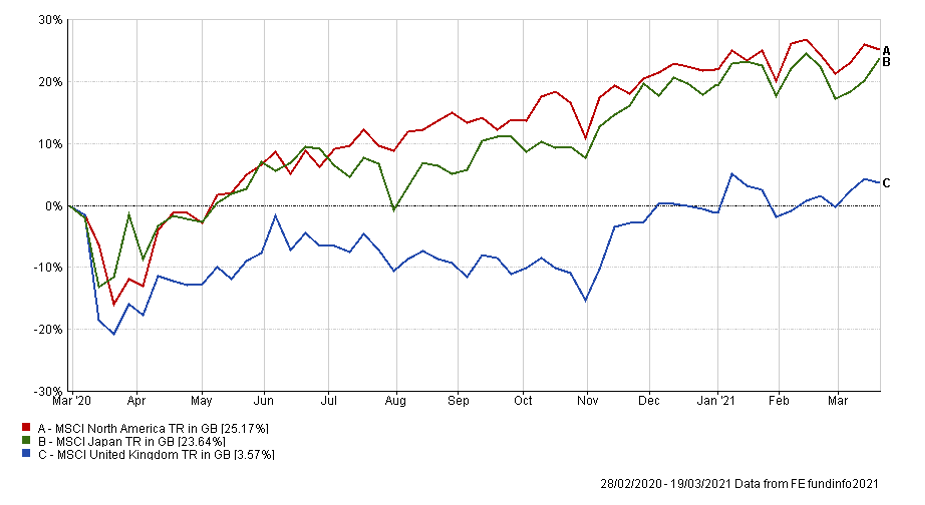As many of us reflect on the last year, we look back at what this has meant for investment markets and what the year ahead may look like.
As ever, investment markets are very difficult to predict, particularly in the short term and we must emphasise the importance of working with your Financial Planner to agree a strategy which is appropriate to you.
What then
It is one year since the UK entered its first lockdown, when markets were experiencing their worst falls in value since the 2008 global financial crisis. Since then, markets have staged a remarkable comeback with many equity markets pushing on to new all-time highs, well above their pre-Covid levels. For most investors who stayed the course and held onto their investments during those turbulent times, they have been rewarded with strong performance that not many would have foreseen.

What now
As the UK now moves towards summer and the planned lifting of restrictions, investors are turning their attention towards what the economic recovery will look like once life moves back towards normality.
Inflation and interest rates
The big concern of investment markets in the early part of the year has been inflation, and what this might mean for interest rates and the subsequent impact on bond yields. The majority of central banks in the world are ‘inflation targeting’. Here in the UK, the Bank of England’s inflation target is 2% and it aims to set interest rates to manage this target. Raising interest rates when inflation is high to discourage spending, lowering rates when it is low to encourage it.
To prevent a larger economic downturn, governments and central banks have been supporting economies, lowering interest rates to record low levels and essentially pumping money directly into the economy with asset purchases and schemes like furlough.
This lowering of interest rates has been a key driver in the strong performance of equity markets since March last year, with bond yields reduced to below zero in places, attracting new money into equities. This is because when there is no real return available from safer assets, investors are forced into assets which carry risk but with the potential for a return.
The quandary in investment markets is that if growth rises, spurring inflation alongside it, then central banks may be forced to raise interest rates to control it in order to meet their inflation target. This might mean the environment for equities becomes a bit less supportive, as rising interest rates would be met with rising bond yields. With higher bond yields, equities become relatively less attractive, and this fear caused some volatility in early March.
Inflation and rising yields are a natural by-product of growth. Equity markets traditionally are boosted by economic growth and inflation induced volatility has perhaps been overblown.
Economic support
Central banks and policymakers have been emphasising for a long time that they are not going to pull the rug from under the economy and support will continue. Andrew Bailey, governor of the Bank of England, stated mid-March the bank was “not out of firepower” in defending the economy, as it continues its recovery from the pandemic. Similarly, more firepower was offered in the US when the Senate voted in favour of a new Covid relief bill. The European Central Bank indicated bond purchases would not slow and they would manage rising yields. The Chancellor’s budget here in the UK extended and continued much of the current support schemes. Globally, economic policies should continue to support investment markets.
Recovery
The biggest danger to the recovery of economies remains Covid-19, and particularly the potential for vaccine resistant strains to emerge. Further outbreaks in mainland Europe have resulted in renewed lockdown measures and this is a situation that will be monitored closely. Economies being able to open freely is a key driver for commodity prices, with oil particularly impacted by the potential for reduced demand under extended lockdowns. The vaccination rate in Europe is much lower than in the UK and US and this could renew trade and Brexit related volatility as they try to secure vaccine supplies for themselves.
Strategy
The key during all of these times is to hold a suitably diversified portfolio at an appropriate level of risk for you and your objectives. Doing this ensures you take advantage of any positive movements and are protected from the worst of any downward falls. Reflecting on the previous year we are pleased that while markets have been volatile, this principle has remained true. It is always concerning when the value of your portfolio falls, however investment markets continue to reward investors even in the most difficult times. As economies recover, volatility will remain, but opportunities will abound.
Invitation
If you would like to discuss your financial plan and investment strategy, then we would love to hear from you. Get in touch with your Financial Planner here at Vesta Wealth in Cumbria, Teesside and across the North of England.
Reach us via:
t: 01228 210 137
This content is for information purposes only. It should not be taken as financial or investment advice. To receive personalised, regulated financial advice regarding your affairs please consult your Financial Planner here at Vesta Wealth in Cumbria, Teesside and across the North of England.

